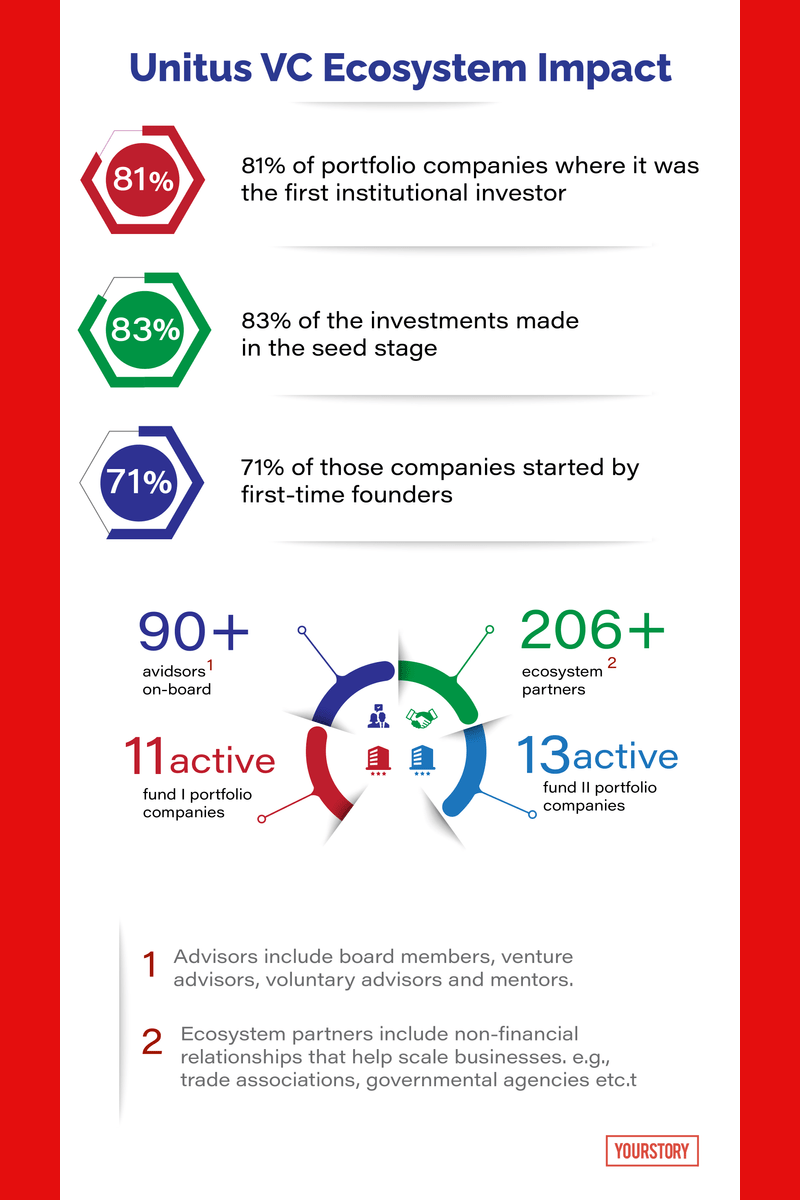Venture capitalist Will Poole “wears two hats” – one in India, the other in Seattle.
As the Co-founder and Managing Partner of Unitus Ventures (for the Indian market) and Capri Ventures (for Latin America, Africa, and Asia) — both funds committed to investing in startups that create opportunity for low-income populations — he’s keen on “finding scalable solutions to problems that have not been addressed yet”.
Especially in the Indian market.
Will believes,
“If you want to build scale, there's nowhere better to go than India. And if you solve problems with the Indian perspective of ‘low-cost high-value’, you're going to have a real edge over the other guys who are starting off at probably 10X your cost base, and therefore, pricing their products accordingly.”
, which he launched in 2012, invests in early-stage tech startups primarily in the sectors of jobtech, fintech, healthcare, and education.
Some of its active investments include BetterPlace, 5C Network, Awign, Milaap, BlowHorn, AddressHealth, Cuemath, DriveU, Eduvanz, GigForce, and Masai School, among others.
Out of its 24 portfolio companies across two funds, 17 have received follow-on funding from Unitus and other investors to continue scaling their businesses.
The VC fund measures impact under three primary parameters – social, economic and ecosystem – aligned with the UN Sustainable Development Goals. These goals include ensuring good health and well-being, ending poverty, and providing quality education for all. Thus, its investments centre around healthcare, education, and jobs.
Creating impact in a pandemic year
Despite the enormous challenges posed by the COVID-19 pandemic, 2020 turned out to be a fairly good year for the Bengaluru-based VC fund. “The pandemic-ridden year taught us that only companies with decisive leaders survive,” Will notes.
He goes on to explain, “Our portfolio companies not only survived but also found new paths of growth through the challenging times. With prompt business decisions driven by a fierce problem-solving attitude and deployment of cutting-edge technology, they recovered revenue while increasing their impact.”
According to Unitus’ 2020 Annual Impact Report, its portfolio companies impacted 12.2 million bottom-of-the-pyramid lives during the year, an increase of 34 percent from 8.9 million in 2019. Their cumulative revenue went up by 26 percent, reaching $141 million.
Jobtech, fintech, and healthcare were the key sectors driving up these numbers, and will continue to remain in focus in 2021 as well.
Will says, “Out of the many gaps that were exposed during the pandemic, the biggest was that of unemployment, especially in the lower socio-economic income population. In this category, Unitus-backed jobtech companies grew their impact by 64 percent to 9.6 million lives, creating opportunities and upscaling skills for a future-ready workforce.”

Infographic: YS Design
The importance of jobtech
In a post-pandemic future, the key thing for a business, according to Will, is to move an expensive, fixed overhead model into a variable overhead model.
“And that's a theme you'll see in many of our investments across the gig economy. Jobtech will pick up as businesses become more tech-enabled. It will help employees get more work as it will be easier to dispatch them to find jobs,” he says.
Almost 54 percent of Unitus investments are in jobtech startups, including BetterPlace, DriveU, Awign, and others.
Take the case of Awign, a gig economy startup that helps students, undergrads, underemployed people, and anybody in need for extra cash find gigs. It has over eight lakh gig workers registered on its platform for an array of work categories.

Above 54% of Unitus investments are in jobtech and gig economy startups
Will shares, “Awign started off by looking at students who had spare time and could do things [here and there]. But, they figured out pretty quickly that it was not just students that had spare time. It was other people too. Maybe they have one job, but they could use some extra cash. For example, if an FMCG company has launched a new product, they need to go and verify if it is displayed in all shops across pincodes. Awign can operationalise that and get results in just a couple of days.”
Unitus believes that jobtech startups will not only add value for entrepreneurs, but for everybody, and also reduce churn and fixed costs for companies.
With the formal economy struggling to offer new jobs post-pandemic, and India’s unemployment rate touching a 12-percent high in May 2021, jobtech could become synonymous with impact creation.

Infographic: YS Design
The paradox of investing in India
In a separate conversation with YourStory, Will also spoke about the unprecedented digital acceleration triggered by the pandemic, with years of growth collapsing into weeks.
“The pandemic has been a massive force for the digitisation of everything. To become digital this way would have taken years, if not decades,” he said.
Take education, for instance. Unitus entered the sector back in 2013, when no one else was looking at it.
"What was a tough area to invest in seven or eight years ago has now become the hottest sector to get into,” Will says.
And perhaps, that is what impact investing is all about. He observes,
“Impact investing is identifying greenfields and underserved markets. To me, it is going a little bit ahead of the herd when others haven’t yet, but also recognising that they will come there because if you’re building real profitable opportunities that can scale, every investor's going to be there sooner or later.”
One of Unitus VC’s earliest investments was in an edtech startup called Cuemath, which runs after-school math programmes.
The investor reveals that Cuemath went through a complete “transformation” within months, going “from 80-90 percent in-person education to 80-90 percent-digital, and growing its business 3X.”
“Cuemath went from being an India-focused company to a global company, all in a couple of months of the pandemic. And that is a fantastic story,” Will says.
However, Cuemath is just one side of the education story. The other may not be as rosy.
Will alludes to an Indian founder, who runs a kindergarten school and K-6 programmes in rural India. “And he's in a world of hurt,” he reveals.
“Because not only are the schools still closed due to a government order, but parents are also not comfortable sending their kids away. So, hundreds of millions of kids in rural India are going to lose a year, maybe two years, of their education because of the damage caused by the pandemic,” he explains.
It is this constant paradox in the Indian ecosystem that has come to define — and even dictate — Unitus’ investing philosophy over the last decade.
“India is a unique market because of its scale and the varied strata and segmentation. There's wealth everywhere in India, but there’s also poverty everywhere,” Will says.
“And for that, the key thing is finding entrepreneurs who focus on the mass markets, which is what I'd call inclusive development. In India, impact is opportunity.”

Will Poole says, "In India, impact is opportunity.”
Impact created by healthcare startups
In the last 15 months, no other sector has come into focus as much as healthcare.
Unitus VC believes that AI in healthcare “will transform everything”. While telemedicine is already on the rise, teleradiology could be the next big wave.
Will elaborates,
“How do we get images of scans up to the cloud where an AI can hit them? And then, how do we get those AI-tagged images back to the board-certified radiologist who can verify them quickly, add value as needed, and get them to the attending physician to make a diagnosis – all in less than a minute."
"That's the kind of thing we're excited about and that's what 5C Network does. When they first came to us, I was astounded to hear that there was no tele-radiology servicing network in India until now,” he says.

AI in healthcare "will transform everything" according to Will Poole.
Bengaluru-based 5C Network, which raised $1.2 million from Unitus and Axilor in December, is an AI-powered radiology platform connecting trained radiologists with patients in remote geographies who have limited access to quality diagnostics.
In 2020 alone, it performed over 900,000 scans in India’s Tier II and III cities, with 37 minutes being the average turnaround time for a report.
That level of speed, if scaled across the country, could be instrumental in early detection of life-threatening diseases, and save tonnes of lives.
Will says,
“The opportunity is huge because the need is huge as there are only about 11,000 radiologists servicing the entire country. So, you're going to have those 11,000 radiologists, but their throughput will double and triple and quadruple overtime. The AI will do the simple things and leave the hard things for them. And at some point, you're going to have an entire diagnosis via AI that's board-certified.”
“That's the kind of entrepreneurs we go after… who can think for mass from the beginning. Our focus is on India's scale as well as global potential,” he adds.
‘Know what you don’t know’
Unitus VC’s investments in India have congregated in a handful of fast-growing areas, but some other sunrise sectors have been left out. Perhaps deliberately.
Agtech, for instance. Why has the fund not done an agtech deal yet?
Will explains,
“One thing that is important in venture capital is to know what you don't know. And, none of us is an expert in the agtech space. We did come very close to doing one or two deals. But then for a variety of reasons, [it didn’t happen]."
"It requires finding an exceptional entrepreneur who understands the execution side, and is not just a city boy, who thinks he can go to a farm and throw some tech around. We need somebody who knows what it is like to have mud on your boots,” he adds.

Agtech is one sunrise sector where Unitus hasn't invested yet
However, an agtech deal could be a reality for Unitus VC in the next few years.
“Fortunately, one of our venture partners had been getting into it. And, we've started to dive more into some agtech startups. You will see us doing an agtech deal within the next year or two,” Will reveals.
"There are some good opportunities out there, and there’s plenty of room for technology to improve agriculture.”
Nine years after Unitus’ first investment in India, Will reckons he has gotten “smarter at picking entrepreneurs”. “Not just entrepreneurs, but also sectors. And recognising the kind of capital necessary to go into a particular area,” he says.
“We are backing gritty entrepreneurs who are creating new opportunities that were not there before. And there is no better point to illustrate this than the fact that none of our Fund I or Fund II companies has failed due to pandemic stress,” he signs off.
Edited by Tenzin Pema
Link : https://yourstory.com/2021/06/unitus-ventures-will-poole-impact-investing-low-income-india
Author :- Sohini Mitter ( )
June 07, 2021
YourStory






Hi,
ReplyDeleteThanks for Sharing nice Info., TASKMO is a tech driven on-demand staffing platform that connect companies with pre screened deployable temporary workers, part time workers, manpower, promoters. Visit website for more details: www.taskmo.com
Gig Economy StartUps India